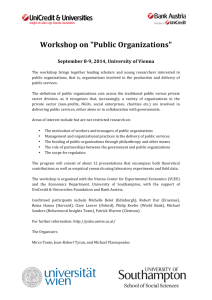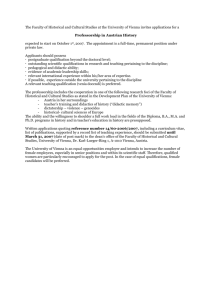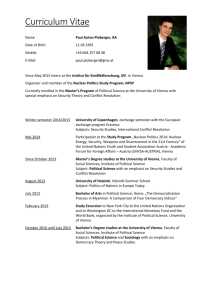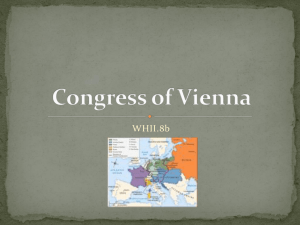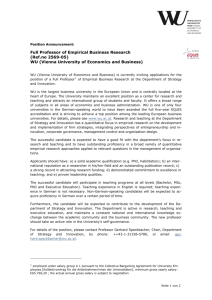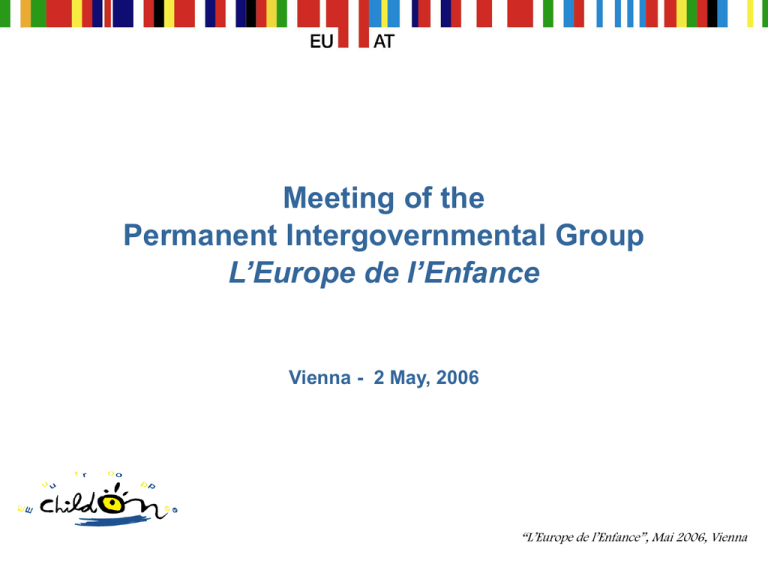
Meeting of the
Permanent Intergovernmental Group
L’Europe de l’Enfance
Vienna - 2 May, 2006
“L’Europe de l’Enfance”, Mai 2006, Vienna
Survey on the UN
Committee on the Rights of the Child
Concluding Observations on the last EU
Countries' Reports
Commissioned by the Austrian Federal Ministry of Social Security,
Generations and Consumer Protection
“L’Europe de l’Enfance”, Mai 2006, Vienna
Aims of the survey
•To identify the issues most frequently examined by
the CRC Committee
•To identify the points of strength and weakness in
the EU Countries CRC implementation
• To point out the issues on which EU Countries can
improve their policies of intervention
“L’Europe de l’Enfance”, Mai 2006, Vienna
Steps of the survey
1. Collection of documents (25 EU member
countries + 4 accession/candidate countries)
2. Overview on the general measures of
implementation of the CRC
3. Identification and analysis of the common
specific issues
4. Realization of a final report
“L’Europe de l’Enfance”, Mai 2006, Vienna
Final report structure
•Introduction on origin, aims, methodology and contents of
the survey
•Analysis of the CRC Committee COs as regards the general
measures of implementation of the CRC
•Analysis of the CRC Committee COs as regards specific rights
•Conclusions
•Executive summary
•Annexed documentation (COs by country and for each
specific issue analysed; relevant documents by the CRC
Committee e.g. general comments and general discussions)
“L’Europe de l’Enfance”, Mai 2006, Vienna
Analysed issues following the structure of
the CRC and the COs:
General measures of implementation
•
•
General principles
•
Civil rights and freedom
•
Education
•
Family environment
•
Basic health and welfare
•
Special measures of protection
“L’Europe de l’Enfance”, Mai 2006, Vienna
1. General Measures of Implementation (GMI)
- Coordination and National Plan of Action
- Dissemination and training
- Independent monitoring institutions
- Data collection P
“L’Europe de l’Enfance”, Mai 2006, Vienna
GMI -Coordination and National Plan of Action (I)
(25 EU countries and 4 accession/candidate countries)
Have any positive achievements been identified? (27)
- the approval of comprehensive national plan of action, incorporating
the objectives and goals of the document “A World Fit for Children”, 2002
(11)
- the establishment and reviewing of the role of governmental bodies
(10)
“L’Europe de l’Enfance”, Mai 2006, Vienna
GMI - Coordination and National Plan of Action (II)
(25 EU countries and 4 accession/candidate countries)
What are the key recommendations? (29)
- to ensure the establishment of a single permanent and effective
coordination mechanism on the rights of the child (12)
- to allocate sufficient financial and human resources for the effective
functioning of such a mechanism in order to allow the effective implementation of
the coordination role (14)
- to strengthen coordination between the various governmental mechanisms
involved in children's rights (8)
- to strengthen the coordination within the institutional framework designed
to promote and protect the rights of the child in particular, cooperating closely
with non-governmental organizations and civil society (8)
- to prepare and implement a coherent and comprehensive right-based national
plan of action for the implementation of the Convention (8)
“L’Europe de l’Enfance”, Mai 2006, Vienna
GMI - Dissemination and training (article 42)
(23 EU member countries and 4 EU accession/candidate countries)
Have any positive achievements been identified? (24)
-The efforts to make the principles and the provisions of the Convention widely
known (14)
What are the key recommendations? (27)
- to continue or strengthen their efforts to make the Convention widely
known and understood by adults as well as children (17)
- to dedicate specific attention, as regards the dissemination of the
convention, to reaching vulnerable groups (8)
- to incorporate the Convention in the school curricula (8)
“L’Europe de l’Enfance”, Mai 2006, Vienna
GMI - Independent monitoring institutions
(20 EU member countries and 4 EU accession/candidate countries)
Have any positive achievements been identified? (23)
- The establishment at the national level of the children's rights
commissioners, ombudsperson for children or national councils for
children (8)
- The existence of a national institution for the general protection
of human rights (8)
What are the key recommendations? (24)
- to establish independent human rights institutions at the national
level accessible to children and empowered to receive and investigate
complaints of violations of child rights (16)
- to support or strengthen with sufficient human and financial
resources the office of the Ombudsman for Children (8)
“L’Europe de l’Enfance”, Mai 2006, Vienna
GMI - Data collection
(25 EU member countries and 4 accession/candidate countries)
Have any positive achievements been identified? (16)
- the extensive quality and quantity of statistical data provided by EU
Countries (12)
- the establishment of specific instruments, programmes or organisms
dealing with the collection of statistical data (6)
What are the key recommendations? (29)
- to use indicators and / or data collected to formulate / monitor
laws, policies and programmes to implement the CRC (21)
- to strengthen efforts to establish / develop / update a (nationwide)
system for a comprehensive collection of indicators and comparative
disaggregated data (15)
“L’Europe de l’Enfance”, Mai 2006, Vienna
2. General Principles (GP)
- Non discrimination (article 2)
- Best interest of the child (article 3)
- Right to life, survival and development
(article 6)
- Respect for the view of the child (article
12)
“L’Europe de l’Enfance”, Mai 2006, Vienna
GP - Non discrimination (article 2)
(24 EU countries and 3 acceding/candidate countries)
Have any positive achievements been identified? (17)
-The effort made to address positive legal and administrative efforts made
to address racial discrimination (14)
What are the key recommendations? (27)
-To include specific information on the measures undertaken by the State
to follow up on the Declaration and Programme of Action adopted at the
World Conference against Racism, Racial Discrimination,
Xenophobia and Related Intolerance, 2001 (22)
-To develop and adoption of effective strategies to eliminate the existing
forms of discrimination among children at the national level (17)
-To ensure equal access to education, health and other services (11)
“L’Europe de l’Enfance”, Mai 2006, Vienna
GP - Best interest of the child (article 3)
(11 EU countries and 4 accession/candidate countries)
Have any positive achievements been identified? (9)
- the inclusion of the principle of best interest in the national
legislation (8)
What are the key recommendations? (15)
- to integrate this principle into all the revisions made to legislation,
judicial and administrative decisions (7)
- to appropriately analyse the principle of the best interests of the child in
all those situations having an impact on children (6)
“L’Europe de l’Enfance”, Mai 2006, Vienna
GP - Right to life, survival and development (article 6)
(6 EU Countries and 2 EU accession/candidate Countries)
What are the key recommendations ? (8)
- to raise awareness about, and undertake public information
campaigns in relation to, accident prevention (4)
- to promote initiatives with a view to diminishing the number and
consequences of accidents involving children (4)
“L’Europe de l’Enfance”, Mai 2006, Vienna
GP - Respect for the view of the child (article 12)
(21 EU Countries and 3 acceding/candidate countries)
Have any positive achievements been identified? (18)
- the adoption of various legal and administrative measures to guarantee the
respect of the view of the child (7)
- the reviewing and harmonising the national legislation in order to
reinforce the rights of the child to express his/her own opinions freely in all
matters affecting her/him (7)
- the establishment of national representative authorities (5)
What are the key recommendations? (24)
- to provide the reinforcement of awareness raising campaigns among the
public in general as well as the education and training of professionals (13)
- to continue to promote within the family, schools, administrative bodies
and other institutions the respect for the view of the children (11)
- to adopt provisions to ensure that article 12 is fully implemented and would be
applicable to courts, administrative bodies, institutions, schools,
childcare centres and in family matters affecting children (8)
“L’Europe de l’Enfance”, Mai 2006, Vienna
3. Civil Rights and Freedom (CRF)
- Right to identity (article 7)
- Freedom of religion (article 14)
- Right to access to appropriate information (article
17)
- Corporal Punishment and Abuse (article 19)
- Torture, degrading treatment and deprivation of
liberty (article 37)
“L’Europe de l’Enfance”, Mai 2006, Vienna
CRF - Right to access to appropriate information
(article 17)
(10 EU countries and 1 EU accession/candidate country)
Have any positive achievements been identified? (9)
- legislative acts and amendments of the Penal Code (5)
What are the key recommendations? (11)
- to strengthen the measures to protect children from the possible
dangers deriving from the use of the media, Internet and
videogames (11)
“L’Europe de l’Enfance”, Mai 2006, Vienna
CRF - Corporal Punishment and Abuse (article 19)
(20 EU countries and 4 accession/candidate countries)
Have any positive achievements been identified? (9)
- that corporal punishment has been prohibited by law in all settings,
including in the family and within various other legal instruments to fight
against domestic violence (6)
What are the key recommendations? (24)
- to take all the necessary legislative measures to extend the prohibition of
corporal punishment on children explicitly in the family, in schools (13)
- to carry out public education campaign about the negative
consequences of corporal punishment (11)
- to undertake initiatives aiming to change the public attitude and
approach to corporal punishment (6)
“L’Europe de l’Enfance”, Mai 2006, Vienna
EDUCATION (E)
E - (articles 28 and 29)
(24 EU countries, 4 accession/candidate countries)
Have any positive achievements been identified? (21)
- the importance given to rights to education (5)
- the provision of free compulsory schooling through a minimum age
(5)
What are the key recommendations? (28)
- further enhance system of education for children with disabilities /
in rural areas /belonging to minority groups / in special schools (17)
- the importance to ensure human rights education (15)
- to take into consideration / promote / implement quality of education
(14)
- to study / prevent / reduce dropping out (13)
“L’Europe de l’Enfance”, Mai 2006, Vienna
5. Family environment (FE)
- Parental guidance and protection owed to families
by the State (articles 5 and 18)
- Alternative care for children deprived of their
family environment (article 20)
- Adoption (article 21)
- Family reunification (article 10)
- Child abuse (articles 19 and 39)
“L’Europe de l’Enfance”, Mai 2006, Vienna
FE - Alternative care (article 20)
(17 EU countries and 4 EU accession/candidate countries)
Have any positive achievements been identified? (5)
-adoption of specific laws or plans of action to care for the needs of
children deprived of their family environment (4)
What are the key recommendations? (21)
- increase the availability of foster care providing greater financial
assistance (14)
- undertake a periodic review of placement (8)
- guarantee the contact between the children placed in out-of-home
care and their parents (8)
- take into account children's views in any decision regarding their
placement (8)
“L’Europe de l’Enfance”, Mai 2006, Vienna
FE - Adoption (article 21)
(9 EU countries and 3 EU accession/candidate countries)
Have any positive achievements been identified? (3)
- ratification of the Hague Convention on intercountry adoption (3)
What are the key recommendations? (12)
- to ratify the Hague Convention or ensure that their legislation complies with the
principle of the Hague Convention (7)
“L’Europe de l’Enfance”, Mai 2006, Vienna
FE - Child abuse (articles 19 - 39)
(21 EU countries and 4 EU accession/candidate countries.)
Have any positive achievements been identified? (21)
- adoption of laws to ensure the protection of the child’s moral, physical
and sexual integrity or to prevent domestic violence (10)
What are the key recommendations? (25)
- to run public campaigns to prevent and combat all forms of child
abuse, also with the participation of children (14)
- to provide for the care, full physical and psychological recovery and
reintegration of the child victims of abuse (12)
- to establish child-friendly procedures and mechanisms to receive,
monitor and investigate complaints (12)
“L’Europe de l’Enfance”, Mai 2006, Vienna
6. Health (H)
- Children with disabilities (article 23)
- Basic health, health care, health services and
welfare (article 24)
- Health of adolescents (article 24)
- Standard of living (article 27)
“L’Europe de l’Enfance”, Mai 2006, Vienna
H - Children with disabilities (article 23) (I)
(19 EU countries and 2 accession/candidate countries)
Have any positive achievements been identified? (21)
- the growing number of children with disabilities who are integrated
into mainstream education (6)
- the establishment of national policy on special education for
children with disabilities (4)
“L’Europe de l’Enfance”, Mai 2006, Vienna
H - Children with disabilities (article 23) (II)
(19 EU countries and 2 accession/candidate countries)
What are the key recommendations? (21)
- to fulfil the principles set in the two Standard Rules on the Equalization of
Opportunities for Persons with Disabilities (8)
-to increase the research on the diagnosis and the treatment of ADHD
(Attention Deficit Hyperactivity Disorder) and ADD (Attention Deficient Disorder)
(7)
- to make available the necessary resources and assistance for activities of the
diagnosis and the treatment of mental health problems (7)
- to provide policies aimed at encouraging the integration of children with
disabilities into regular educational system and the inclusion into society also by
providing special training to teachers and making school more accessible (7)
“L’Europe de l’Enfance”, Mai 2006, Vienna
H - Health of adolescents (article 24)
(23 EU countries and 2 accession/candidate countries)
Have any positive achievements been identified? (10)
- efforts / progress on the issue of health problem faced by adolescents, in
particular about:
• drug abuse (4)
• tobacco (4)
• use and alcohol abuse (3)
• cases of sexually transmitted diseases (STDs) and HIV/AIDS (2)
• health and sex education in schools (3)
What are the key recommendations? (25)
- to promote / develop / strength mental health programmes, policies / services
for adolescents (16)
- to promote / include or strengthen the programme of health education in
schools (15), including sexual and reproductive health (12)
- to develop youth-friendly counselling, care and rehabilitation facilities (12)
- more information campaigns / programmes addressed to adolescents
concerning family planning or birth control measures (11)
“L’Europe de l’Enfance”, Mai 2006, Vienna
7. Special measures of protection (SMP)
- Street children (articles 9 and 20)
- Unaccompanied foreign children, refugees and asylumseeking children (article 22)
- Children of minorities or of indigenous peoples (article
30)
- Economic exploitation (article 32)
- Drug abuse (article 33)
- Sexual exploitation, abuse and trafficking (articles 34
and 35)
- Administration of juvenile justice (articles 37, 39 and
40)
“L’Europe de l’Enfance”, Mai 2006, Vienna
SMP - Unaccompanied foreign children, refugees and asylum-
seeking children (article 22)
(20 EU countries and 3 accession/candidate countries)
Have any positive achievements been identified? (17)
- effort to discuss / approve national legal reforms to improve the
legal situation of asylum-seeking children and to pay more attention to
their needs (11)
- establish or increase special accommodation / reception centres
for unaccompanied minors and separated asylum-seeking children (3)
What are the key recommendations? (23)
- to facilitate access to basic services such as education and health
(15), in particular ensure adequate living conditions and full / equal
access to education, health services, including psychological care (9)
- the need of special assistance and protection of the rights of
children in particular legal aid and procedures of children seeking asylum
(10)
- the need to adopt national legislative reforms (10) / implement
existing laws (7)
“L’Europe de l’Enfance”, Mai 2006, Vienna
SMP - Children of minorities or of indigenous peoples (article 30)
(19 EU countries and 4 EU accession/candidate countries)
Have any positive achievements been identified? (13)
- the adoption of specific laws or plans of action on the rights of
minorities and for the prevention of their social exclusion (6)
What are the key recommendations? (23)
- to adopt legislative measures and implement policies aimed at the full
enjoyment of the rights enshrined in the Convention by Roma children
(6)
- to adopt measures to promote the social inclusion to combat the
marginalisation of Roma children in society (6)
“L’Europe de l’Enfance”, Mai 2006, Vienna
SMP - Drug abuse (article 33)
(21 EU countries and 3 EU accession/candidate countries)
Have any positive achievements been identified? (6)
- the efforts undertaken to prevent and fight this phenomenon, e.g.
through health education in schools and national plans of action and
programmes (6)
What are the key recommendations? (24)
- to strengthen or set up appropriate services for the care and
rehabilitation (13)
- to provide children and parents with accurate and objective
information about the harmful consequences of drug, alcohol and/or
tobacco abuse (9)
“L’Europe de l’Enfance”, Mai 2006, Vienna
SMP - Sexual exploitation, abuse and trafficking (articles 34, 35)
(23 EU countries and 1 accession/candidate country)
Have any positive achievements been identified? (15)
- the adoption of the National Plan of Action, to fight commercial
sexual abuse of children and against sexual abuse and child pornography
on the Internet (7)
- the amendment of criminal law providing a new regulation on
trafficking in human beings, prostitution, pornography and sexual
tourism targeting children (7)
What are the key recommendations? (24)
- to establish national monitoring mechanisms and of undertaking
studies assessing the causes, nature and extent of sexual exploitation,
including on the Internet (11)
- to establish appropriate recovery and reintegration programmes
and services (9)
- to allocate appropriate human and financial resources to policies
“L’Europe de l’Enfance”, Mai 2006, Vienna
and programmes in this area (7)
SMP -Administration of juvenile justice (articles 37, 39 and 40)
(25 EU countries and 4 accession/candidate countries)
Have any positive achievements been identified? (12)
- the adoption of juvenile justice law reforms have been approved (12) or
still pending discussion in national Parliaments (4)
- the introduction of a system of special juvenile justice courts and of
training courses for juvenile justice staff (2)
What are the key recommendations? (29)
- to ensure the full implementation, compliance or integration of juvenile justice
standard rules, in particular articles 37, 39 and 40 of the CRC, as well as the
Beijing Rules, the Riyadh and the Vienna Guidelines (26)
- as regards criminal law and criminal proceedings, take into consideration the
need to have access to legal aid / the need to alternative measures, including
pre-trial detention / the need to increase probation (19)
- to ensure that the deprivation of liberty of children is really a measure of
last resort (17), accompanied by the request for it to be the shortest time
possible (8), separated from adults in detention or custody (10)
- need for specialized training for the juvenile justice staff (12)
“L’Europe de l’Enfance”, Mai 2006, Vienna
Some conclusions
- the majority of general measures and principles are not
present only in their specific paragraph at the beginning
of the Committee’s COs
- the great attention of the Committee to leading the
States parties, through a positive and open dialogue, in
the process of CRC implementation at the national level
- the discussion between the Committee and the States
aims to disseminate a culture based on the children’s
rights
- the need for technical assistance for the implementation
of the CRC and other UN international standards in
specific issues
“L’Europe de l’Enfance”, Mai 2006, Vienna
The final report, at the end of June, will
be published in a CD-Rom and in the
web site: www.childoneurope.org
“L’Europe de l’Enfance”, Mai 2006, Vienna
“L’Europe de l’Enfance”, Mai 2006, Vienna
THANK
YOU VERY MUCH
FOR YOUR PRECIOUS
ATTENTION
“L’Europe de l’Enfance”, Mai 2006, Vienna

